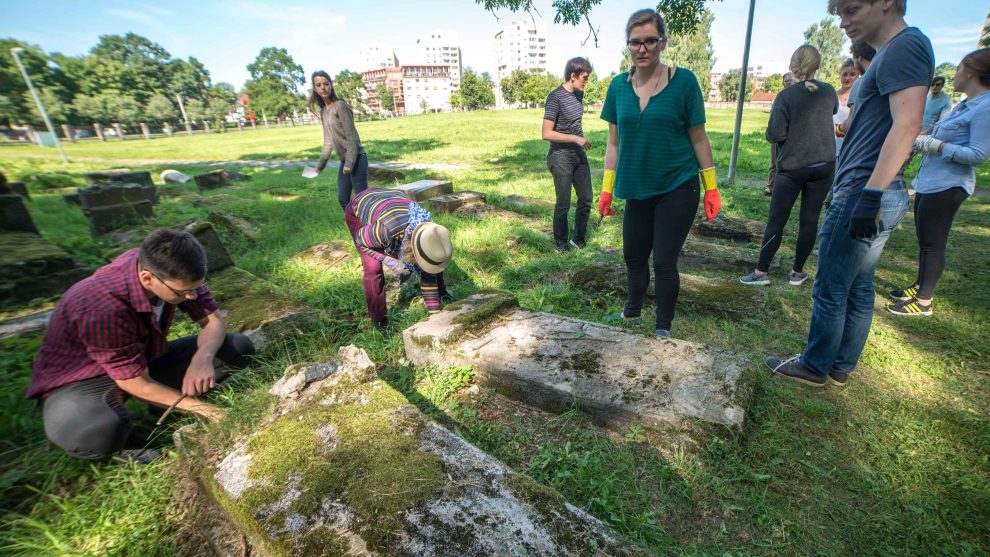A Team of Foreigners Took on an Important Mission in Kaunas

Paskelbta: 2017-08-10 (Thursday)
A group of foreign students who are volunteers staying in Kaunas is continuing work started by the city of Kaunas in the old Jewish cemetery of Žaliakalnis. Twenty five young men and women from Germany, Austria, Ukraine, and the Netherlands are continuing to document thousands of graves alongside their like-minded Lithuanian counterparts. This will help to identify those buried in the burial grounds, as well as when and where the burial took place.
This week an international summer camp, joint project between the city of Kaunas and Public Enterprise “Maceva”, started and was joined by the academic youth of Vytautas Magnus University. It is expected that in the next two weeks the volunteers will complete a detailed photo documentation of the old Jewish cemetery of Žaliakalnis which was started last year.
“We should not move anything. Just wipe the moss off the tombstones, number them, and document it. Let’s divide into several groups and start from different sides. This will be more efficient. Let’s start from the bigger quarter,” echoed the sounds of the morning briefing received by several dozen enthusiastic young people before they began their work.
This is the third year that the international summer camp is organised by the Public Enterprise “Maceva” in Lithuania. “Maceva” was invited to join the project by their main partner and project coordinator German organisation “Action Reconciliation Service for Peace”.
“Our stay in Lithuania will be interesting on so many levels. By working here, we will also get to know the nation that survived repressive regimes. Lithuania is unique because it experienced a double test in Nazi and Soviet occupations. This experience is very useful in today’s concept of global Europe. We are grateful to the city of Kaunas and VMU for their support and opportunity to be here. We will try to be of help, because it is obvious that local Jewish communities here, just like in other countries, are too small and need outside help in order to take care of the old cemetery,” said Marius Harnischfeger, the representative of German guests.
Such camps are organised not only in Lithuania, but also in Greece, Italy, Hungary, and Bosnia and Herzegovina. In November work carried out by the German guests will be presented at the international conference in Berlin.
Professor Jonas Audėjaitis, the member of Kaunas City Council and architect, greeted guests: “I hope that you have settled in, have had a nice meal and that your stay in Kaunas will be full of great memories. Until recently, this cemetery was a gathering place for people with bad intentions, but for some time now Kaunas has been trying to revive it, clean and present it to the public as a place of eternal rest. A lot of work has already been done, but plenty more lies still ahead, so your participation and willingness to contribute to it are very significant and greatly welcomed. We are grateful that you will spend these two weeks in Kaunas with such a meaningful mission.”
In cooperation with “Maceva”, members of Kaunas City Council decided to organise the international summer camp specifically in Kaunas. This year, just like the year before, Vytautas Magnus University community is also joining the process of identification of almost six thousand graves. By ensuring close collaboration it is aimed to finish the inventory stage, which requires great attention.
“Last year, these graves were documented by students of Vytautas Magnus University, but thousands of gravestones require special care and certain details still need to be clarified. So this is what we will be trying to do this time in order to complete this important stage of the cemetery inventory,” said Sandra Petrukonytė, one of the project leaders managing the foreign delegation.
With the territory of 8 ha, the old Jewish cemetery of Žaliakalnis in Kaunas is considered one of the largest in the city. Historical cemetery was established in 1861 and closed in 1952. The cemetery is protected by the state and included in the State Register of Cultural Heritage. It is known that many famous politicians, scientists, religious leaders, and cultural activists like writer Jakovas Lifšicas or singer Danielius Dolskis were buried in this cemetery. It is hoped that following the successful documentation, many more tombstones of historical personalities will be identified.
Kaunas City Municipality initiated the cemetery cleaning project last year. The cemetery fence was rebuilt, automatic gates were installed, video surveillance cameras were installed around the entire perimeter, grass and bushes are regularly cut, and locations of mass graves are currently being clarified.
Since 2015, after signing a cooperation agreement, Kaunas has been organising joint projects with Public Enterprise “Maceva”. This non-profit organisation seeks to preserve the Lithuanian Jewish cemetery as an integral part of our nation’s history and culture.






